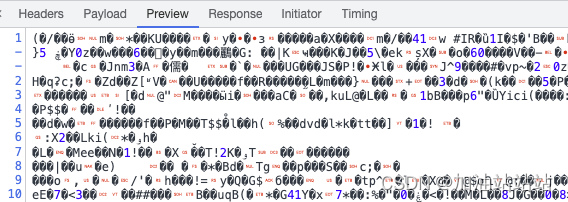如果可以实现记得点赞分享,谢谢老铁~
1.需求描述
由于后台返回数据量大,请求资源比较耗时,需要一个方案来优化性能,下图是一个后台返回一个二进制的文件,需要解析成我们想要的对象

2.使用场景
采用ZSTD方案,官网链接:http://facebook.github.io/zstd/ (可能需要翻墙)
3.首先需要先安装包,命令:
npm install fzstd
or
yarn add fzstd
4.结合官网的例子,首先展示案例及说明
// I will assume that you use the following for the rest of this guide
import * as fzstd from 'fzstd';
// This is an ArrayBuffer of data
const compressedBuf = await fetch('/compressedData.zst').then(
res => res.arrayBuffer()
);
if (fzstd) {
//将ArrayBuffer转换成Uint8Array, zstd输入参数必须为Uint8Array类型
const compressed = new Uint8Array(compressedBuf);
// 解压缩成Uint8Array
const decompressed = fzstd.decompress(compressed);
// 将字符串转为JSON
let result = new TextDecoder().decode(decompressed);
result = JSON.parse(result);
}
5.由于我采用的是axios, 所以需要特殊处理一下
因为咱们是解析一个二进制的文件,所以需要进行指定返回类型
需要指定 responseType: “arraybuffer” 很重要!!!
export async function getCaseById(params: props): Promise<any> {
return request("//getById", {
method: "GET",
data: params,
responseType: "arraybuffer",
});
}
6.然后再响应拦截器中获取,需要指定判断一下 :response?.config.responseType === “arraybuffer”
instance.interceptors.response.use(
async function (response: any) {
if (response?.config.responseType === "arraybuffer") {
if (fzstd) {
//将ArrayBuffer转换成Uint8Array, zstd输入参数必须为Uint8Array类型
const compressed = new Uint8Array(response?.data);
// 解压缩成Uint8Array
const decompressed = fzstd.decompress(compressed);
// 将字符串转为JSON
const result = new TextDecoder().decode(decompressed);
response.data = JSON.parse(result);
}
} else {
if (!response?.data.data) {
message.error(response?.data.message || "服务器异常,请稍后再试");
return;
}
}
return response?.data;
},
收工!谢谢老铁们的点赞收藏~